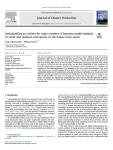Broccardo L., Zicari A. (2020). Sustainability as a driver for value creation: a business model analysis of small and medium entreprises in the Italian wine sector. Journal of Cleaner Production, 20/06/2020, vol. 259, p. 1-11.
https://doi.org/10.1016/j.jclepro.2020.120852
https://doi.org/10.1016/j.jclepro.2020.120852
| Titre : | Sustainability as a driver for value creation: a business model analysis of small and medium entreprises in the Italian wine sector (2020) |
| Auteurs : | L. Broccardo ; A. Zicari |
| Type de document : | Article |
| Dans : | Journal of Cleaner Production (vol. 259, June 2020) |
| Article en page(s) : | p. 1-11 |
| Langues : | Anglais |
| Langues du résumé : | Anglais |
| Catégories : |
Catégories principales 09 - ENTREPRISES ; 9.1 - Entreprise généralités (gestion, organisation)Thésaurus IAMM COMMERCE ; VIN ; PERFORMANCE ; FAMILLE ; ENTREPRISE ; ENTREPRISE COMMERCIALE ; CREATION DE VALEUR ; PME ; VITICULTURE ; RENTABILITE ; GOUVERNANCE ; INNOVATION |
| Résumé : | This research explores the role of sustainability in the business models (BMs) of small and medium enterprises (SMEs) that are operating in the wine sector in Italy, thus addressing recent calls in the literature on BMs. Consequently, this empirical paper offers a contextualized two-step analysis of the BMs of those firms, with a focus on their economic, environmental, and societal indicators. First, a study of a large set of firms all over the country points out the better profitability of some companies, in particular, family-owned companies. Second, a questionnaire survey identifies the key elements that contribute to that higher performance. The companies in this set are small and medium in size, as the Italian wine sector is mostly composed of these kinds of firms. Our data cast new light on the role of sustainability in BMs and its relationship to economic performance. Furthermore, our results point to the difference in performance between family and non-family firms. This latter focus leads us to propose two different BMs for SMEs in the wine sector in Italy, based on their type of governance, i.e., family or non-family. Our findings also suggest that sustainability can create value by achieving innovation in BMs in the long run. However, we found that the studied firms have not yet fully integrated sustainability into their own BMs. |
| Cote : | Réservé lecteur CIHEAM |
| URL / DOI : | https://doi.org/10.1016/j.jclepro.2020.120852 |







